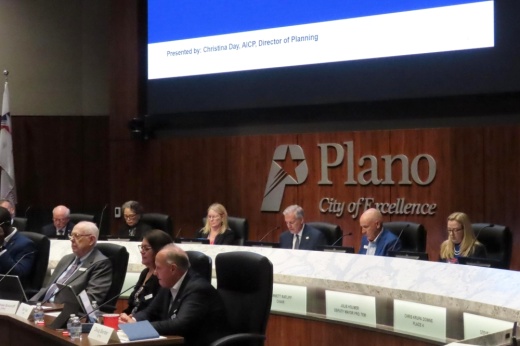What you need to know
City staff drafted changes to Plano’s development policies after new state legislation, specifically Senate Bills 15, 840 and 2477, passed in the 89th Texas legislative session.
Planning Director Christina Day said SB 840 will impact nearly 30% of Plano’s land as it allows multifamily and mixed-use residential developments to be developed by right in all nonresidential zoning districts in Plano.
To see a map of the affected areas, click here.
Day said the primary impacts will be on Plano’s commercial areas and retail corners, specifically in areas previously designated for retail, commercial or office use.At their Aug. 25 meeting, Plano City Council members approved three main ordinances, with amendments including:
- Regulating residential density through height limits and minimum unit sizes
- Introducing updated building, site and landscape design standards
- Allowing single-family tier 2, such as townhomes, in select nonresidential zones where multifamily is now allowed
- Removing multifamily housing as an allowed use in the residential community design district
- Prohibiting residential balconies facing expressways and requiring landscape buffers near expressways
- Requiring developers to disclose, via signage and notices, that residential use is allowed due to state law, not city jurisdiction
“The city is losing a lot of its discretion when it comes to these cases,” Day said. “We thought it was important to do something expedient to ensure quality development.”
City Council also approved additional changes to required development fees, including:
- $5 fee for each notice sent to nearby residents
- $10,000 fee for water and sewer impact analysis studies
Deputy Mayor Pro Tem Julie Holmer said while there is room for further discussion on the changes, the city had to protect residents from potential impacts when the legislation goes into effect Sept. 1.
“I really don’t feel that I’d be doing my job if I didn’t do everything in my capabilities to safeguard the little bit [of growth] that’s left of the city,” Holmer said. “It's painful, but at the same time, I think it's the right thing to do as we navigate this process."
Mayor John Muns said it would be irresponsible for the city to allow development in areas affected by SB 840 without updating Plano’s local ordinances.
“The one thing that happens on Sept. 1 is we no longer have any ability to [determine] what we think is appropriate in certain areas,” Muns said. “Senate Bill 840 [and] 15 have taken complete authority away from what our community would like to see. ... We want to set a standard of quality of building that’s being built and make [developers] stand by that quality.”
Additionally, while the legislation was intended to bring more affordable housing, Muns said he does not expect to see developers moving to build tax-credit or affordable housing in Plano when they could just build multifamily.
William L. Cravens, local developer, said throughout his 50 years developing in Plano, he has seen various city development plans that all had significant public input, which he said was not present during this process.
“There are a lot of unknowns,” Cravens said. “We have no idea where these things may end up lying because it’s all so new to everyone. ... I just am concerned about unintended consequences of some of the language in the document.”
What’s next?
Day said residents should anticipate changes that may be inconsistent with Plano’s development patterns up to this point, particularly at retail corners and adjacent neighborhoods.
“We wanted to be very transparent and let anyone that’s interested in development know changes are coming,” Day said. “If a development were to come in, we would do what we could under the law with the circumstances we’ve been given.”
The amended ordinances and the new state legislation will go into effect Sept. 1.





